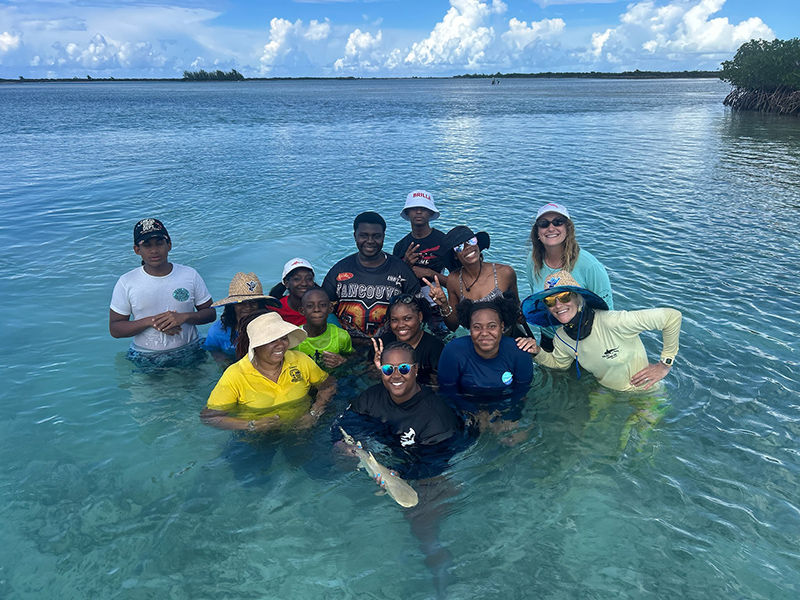Meet Ambassador Bianca Rangel
- Sharks4Kids

- Feb 9, 2022
- 4 min read
Bianca is a Biologist, PhD candidate in Physiology at the Institute of Biosciences of the University of São Paulo, Brazil. She studies the ecophysiology of sharks and batoids, integrating aspects of energy metabolism, reproduction and trophic ecology to investigate: (1) how elasmobranchs allocate energy for reproduction and migration; (2) how urbanization and ecotourism are affecting their diet; and (3) the impact of fisheries on their physiology and reproduction. She is doing her PhD in partnership with Shark Research & Conservation Program at University of Miami, and currently studying sharks from south Florida, the Bahamas and in the Fernando de Noronha Archipelago, Brazil.
Bianca é Bióloga, doutoranda em fisiologia pelo Instituto de Biociências da Universidade de São Paulo, Brasil. Ela estuda a ecofisiologia de tubarões e raias, integrando aspectos do metabolismo energético, reprodução e ecologia trófica para investigar (1) como os elasmobrânquios alocam energia para reprodução e migração; (2) como a urbanização e o ecoturismo estão afetando sua dieta; e (3) o impacto da pesca em sua fisiologia e reprodução. Ela está fazendo seu doutorado em parceria com o Shark Research & Conservation Program da Universidade de Miami, e atualmente estuda tubarões do sul da Flórida, nas Bahamas e no Arquipélago de Fernando de Noronha, Brasil.
We are thrilled to welcome Bianca as an official ambassador! She is doing virtual and in person lessons, creating graphics and translating materials!
1. What is your favorite shark/ray and why?
My favorite shark (at the moment) is the tiger shark. I do not know if it is because of their wonderful stripes, or because they are so expressive...or because adults are huge. The fact is that, despite there are many studies with tiger sharks, their life history and how they live is still a great enigma. It fascinates me.
Meu tubarão favorito (no momento) é o tubarão tigre. Não sei se é por causa de suas listras maravilhosas, ou porque são tão expressivos...ou mesmo porque os adultos são enormes. O fato é que, apesar de existirem diversos estudos realizados sobre os tubarões-tigre, sua história de vida e como eles vivem ainda é um grande enigma. Isso me fascina.

Bianca tagging a tiger shark
2. What is one species of shark you would like to see/study?
There are several species I would like to study and see, but one of them is definitely the hammerhead shark (any species).
Existem várias espécies que eu gostaria de estudar e ver, mas uma delas definitivamente é o tubarão-martelo (qualquer espécie).
3. Can you tell us a little about your research?
In my current research, I investigate the effect of the life-stage, spatial and temporal variation on the nutritional condition and trophic relationships in sharks of different life-history strategies. I use physiological tools and non-lethal, minimally invasive methods to study them. Specifically, I analyze the concentrations of sex hormones (testosterone, progesterone, and estradiol), lipid metabolites (e.g. triglycerides, cholesterol, and ketone bodies), fatty acid profiles and stable isotope signature in blood and muscle tissue samples from sharks. It is like doing a medical exam on sharks to understand what they are eating and how it varies throughout the year or depending on their size or sex.
Na minha atual pesquisa, investigo o efeito do estágio de vida, variação espacial e temporal na condição nutricional e relações tróficas de tubarões de diferentes estratégias de história de vida. Uso ferramentas fisiológicas e métodos não letais, minimamente invasivos, para estudá-los. Especificamente, analiso as concentrações de hormônios sexuais (testosterona, progesterona e estradiol), metabólitos lipídicos (por exemplo, triglicerídeos, colesterol e corpos cetônicos), perfis de ácidos graxos e assinatura isotópica estável em amostras de sangue e tecido muscular de tubarões. É como fazer um exame médico em tubarões para entender o que eles estão comendo e como isso varia ao longo do ano ou dependendo do seu tamanho ou sexo.

4. Why is science communication and education important to you?
I see the science communication and education as the most effective way to protect sharks. It's the only way for general public to understand what we do, and support us to continue working to better understand how sharks live and what threats they face.
Vejo a divulgação científica e a educação como a forma mais eficaz de proteger os tubarões. É a única maneira do público geral entender o que fazemos e nos apoiar para continuarmos trabalhando para entender melhor como os tubarões vivem e quais ameaças eles enfrentam.
5. What is one thing you wish everyone knew about sharks?
That sharks (and rays) can have their babies in different ways, including that they can even secrete uterine milk to nourish them during the gestation.
Que os tubarões (e raias) podem ter seus bebês de diferentes maneiras, inclusive que podem até secretar leite uterino para nutri-los durante a gestação.

Bianca taking a blood sample from a cownose ray
6. What advice would you give other young women who are interested in marine biology?
Work with mentors and collaborators who support other women in science, who give you opportunities and who believe in your work. Never believe that you are not capable of doing some stage of your work, much of science is done with techniques, that anyone with a desire to learn is capable of doing.
Trabalhe com mentores e colaboradores que apoiem outras mulheres na ciência, que te deem oportunidades e que acreditam no seu trabalho. Jamais acredite que você não é capaz de fazer alguma etapa do seu trabalho, muito da ciência é feito com técnicas, isso qualquer um com vontade de aprender é capaz de fazer.





















